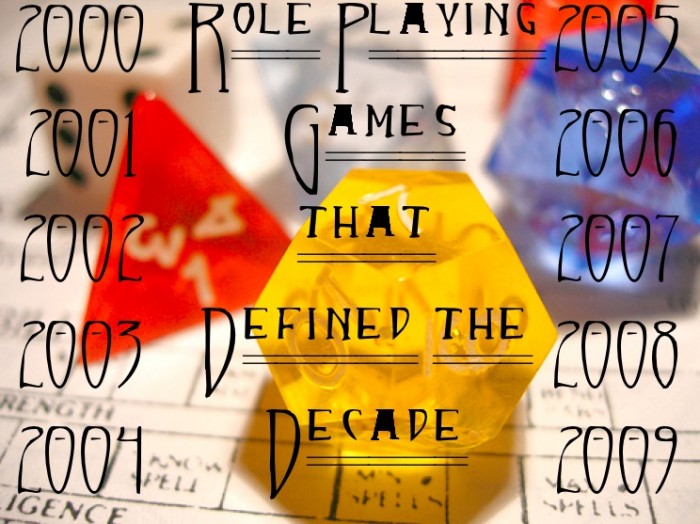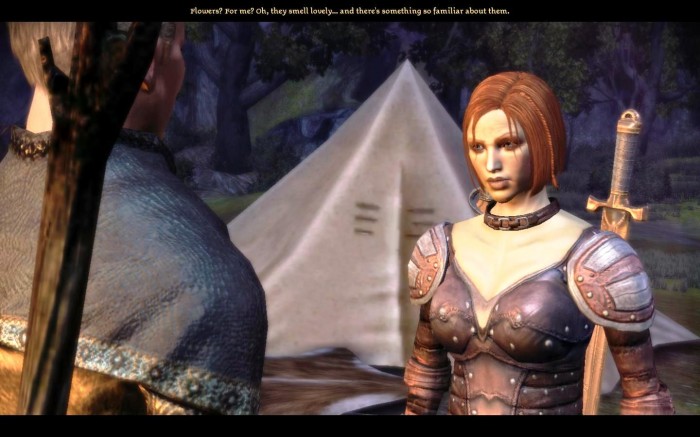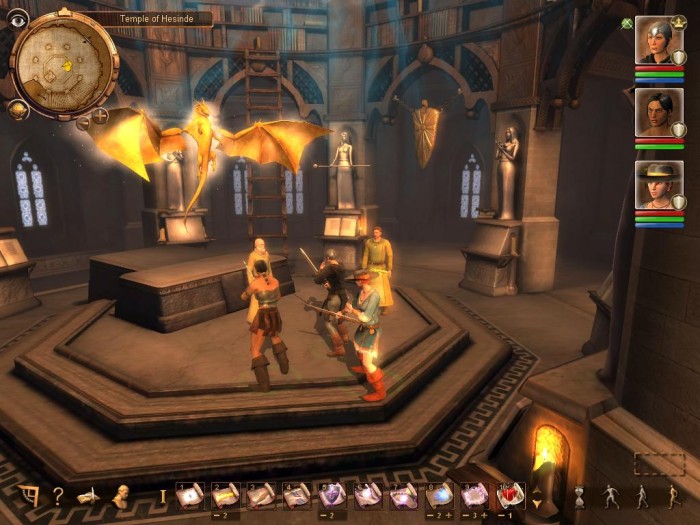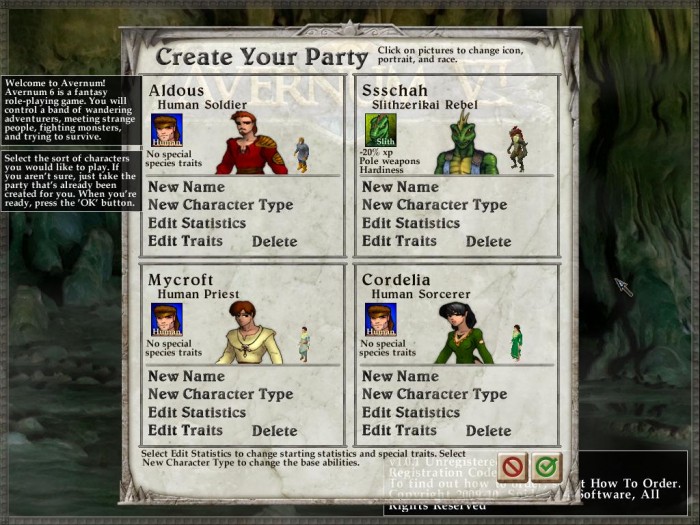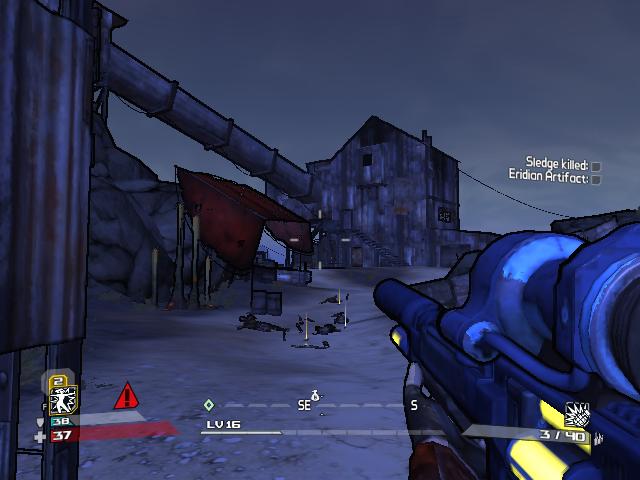Last month I provided an introduction to the series I am now kicking off for real: a look back at the last decade as seen through the lens of a PC Single Player RPG fan. Now after getting all of the full reviews completed for my top games for last year, it is time to begin the journey in earnest by looking at five games that shaped the genre in 2009!
As a reminder of what I’m doing, as we enter a new decade I thought it was worth taking a look back at the last decade and what has been happening in the PC role playing game genre. The 2000’s saw great upheaval and change for the entire gaming industry, and particularly for the PC – it seemed that while every cool new innovation has historically landed first on the PC, the last decade saw every problematic issue hit the PC, causing some to speculate upon the death of the PC as a viable gaming platform. Of course, PC gaming was never really in jeopardy of truly dying, and the last few years have seen a serious resurgence of interest in the platform.
I’ve seen some comments on various sites where the original article was linked, and wanted to clarify what this was and wasn’t about. First off, since I wrote the introduction early in the year, there were few games available – Mass Effect was a clear choice, but Greed – Black Border was added because … well, because it was there (also I consider Avernum 6 a 2009 game and I hadn’t played enough Din’s Curse to include it). But the choice does highlight something – I don’t plan this to be a ‘top sellers’ or ‘greatest hits’ or whatever. I am looking to highlight the games that really say something significant about the state of the PC RPG genre in the year I’m covering. And, in good year I will also list a few other games released that year – and will also occasionally give out a ‘special award’ of some sort.
Some years that will be harder than others – I’ve read comments that more or less say ‘I can’t think of 50 games from the last decade, let alone 50 significant ones’. And that is the crux of my point writing this: I CAN think of 50 games from the 2000’s that feed in a significant way into how someone playing or developing a game in 2010. And as I said before, I find that boiling a decade to 5 games total ends up focusing on what wasn’t on the list.
One final note: as we go back a bit further in years I will make some opinions about where I feel a game has landed in terms of historical perspective, but for 2009 it is way too soon to assess that.
So with all of that said, let’s get started for real with the 5 PC RPG Games That Shaped The Year 2009!
Game: Dragon Age: Origins
Released: November 2009
Developer: Bioware
Key Features: Any game that claims to be the ‘spiritual successor to Baldur’s Gate’ is bound to fall to close scrutiny. While it is definitely possible to compare items from the old series with Dragon Age, that really misses the point. Dragon Age features a robust character creation system; an interesting ‘Origins’ approach that provides character context beyond what most games offer; loads of skills and spells; challenging RTwP (Real-Time with Pause) combat with a nicely integrated tactics system to help augment micromanaging your party; and a fully developed party system with individual relationship tracking. Technically the game has solid graphics, great sound and voice work, flexible controls, and a tightly integrated DLC and patching system that allows you to handle nearly everything from within the game.
Why it is on the list: Dragon Age represents the ‘state of the art’ in high-fantasy RPG as of 2009. As I said in my review, “For me that is just the crowning glory of Dragon Age – not only do I love nearly every aspect of the game, I also love how after finishing it a couple of times I am thoroughly enjoying a new play-through as I contemplate my actions and consequences from the prior runs. I have often lamented the many ways I feel gaming has taken steps backwards in the quest to be more ‘HD’ and ‘cinematic’, but games like Dragon Age show how classic gaming and modern gaming can work together to produce a tremendous game that is satisfying to folks raised on PC classics as well as those who are only familiar with controllers. And THAT is an epic achievement!”
Current Outlook: As I write this we have recently seen the release of another bit of Dragon Age DLC, which I reviewed here. In this regard Dragon Age has done something amazing – not only does it keep traditional hardcore folks engaged for a long period based on the length, depth and breadth of content, the add-ons have kept considerable mindshare with younger ‘short attention span theater’ kids who generally move on to the next bright shiny release within a month.
Availability: Still commanding close to full price at retail and digital download sites. DLC and Awakenings expansion still selling for full retail price.
Game: Drakensang: The Dark Eye
Released: April 2009
Developer: Radon Labs
Key Features: Drakensang is based on a German Paper & Pencil (PnP) game called DSA (Das Schwarze Auge… or The Dark Eye, typically abbreviated DSA or TDE depending on language), which immediately tells you that there will be plenty of rules and virtual dice rolls, but the structure will be different from D&D-based games. The game is party based, story driven, has loads of turn-based combat, and a huge world to explore. It is not truly ‘open world’ as many areas get permanently closed after you leave, but nor is it a ‘corridor game’ like Knights of the Old Republic. The character advancement system is deep with loads of skills and options and ways to play things through.
Why it is on the list: Drakensang represents a different way of going about things from the typical D&D RPG franchises. The colors are bright and cheery, though not as saturated as the King’s Bounty franchise. The style is light and there is loads of humor infused throughout. But at the same time there are loads of choices and serious issues the character confronts throughout the game.
In my review I mentioned that “my worst complaints about the game – slow movement, one disproportionately difficult battle, missing stuff in the manual and help text, and a somewhat cliched story – I must really like this game. And I do. It is not the sort of game that ten years from now people will be touting as ‘one of the best’ the way they will The Witcher, but it is a very good game that is one of the best RPG’s of the last several years. It has everything that fans of the genre seek – role-playing, choices with consequences, party-based adventuring, turn-based combat, an epic story that allows you to influence the outcome in many ways, and so on. But for those who are not enamored with fantasy games, or don’t like turn-based games, and gravitate to fast-paced action games, there isn’t anything here to draw you in. This is not a ‘genre broadening’ game like Fallout 3 that bridges shooter and RPG elements – Drakensang is pure RPG through and through.”
Current Outlook: As I mention below in availability, Drakensang is budget priced a year after release. There is a prequel called ‘The River of Time’ coming at some point this year, already released in Germany, which apparently makes many improvements. However, Radon Labs recently filed for insolvency in Germany – they say that the release of the English editions and the upcoming add-on are not in danger, but it seems clear that this small developer is in serious trouble.
Availability: As of right now, Amazon has Drakensang for $9.99 regular price with a $7.99 sale that has been going on for at least a few weeks. You can also get it from the various digital download sites, but it tends to cost $20 or more on those.
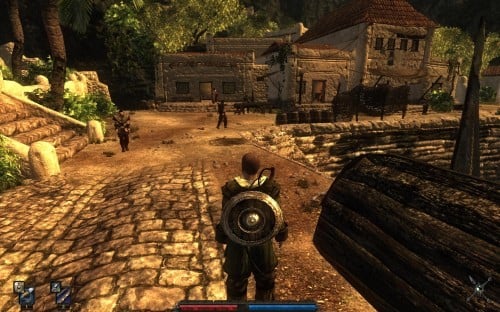
Game: Risen
Released: October 2009
Developer: Piranha Bytes
Key Features: Risen is really the ‘spiritual successor’ to the Gothic games, created by Piranha Bytes the folks who made Gothic 1 – 3. And so while anything related to the Gothic IP has changed, familiarilty with those earlier games tells you all you need to know about Risen: action-based combat, factions to join, plenty of choices, great skills from trainers, interesting story to keep you engaged, and punishing difficulty. Also just like the Gothic games, Risen is single-player – both in terms of you controlling a single character and not having any sort of multiplayer.
Why it is on the list: As I said in my review, “Risen is an excellent game with a few end-game flaws. Not enough to mar the experience too deeply, but enough that it is frustrating – but particularly because the rest of the game is so well done! Is it the ‘RPG of the Year’? Not likely. In fact, since I was in the midst of my second run through Risen, Bioware’s Dragon Age came out, and the release of Divinity 2 was announced for early next year. Dragon Age is a towering epic that dwarfs all others this year, but Risen is a game that I can easily and overwhelmingly recommend to fans of the Gothic games as a ‘full price buy’. If you enjoyed Oblivion, but were looking for something with more depth, challenge and choices, Risen offers a great experience. Risen is a great game that will occupy you for dozens of hours and keep you coming back for more!”
Current Outlook: Risen did reasonably well in terms of sales for the PC, but was less favorably reviewed for the XBOX360. During the weeks after the release the game topped the Direct2Drive and Steam download charts, but since then it has fairly well faded into obscurity. There was word of a sequel or add-on, but it isn’t clear yet where that stands. With the lack of updates since October
Availability: Risen is still widely available at retail as well as on the digital download sites such as Impulse and Direct2Drive.
Game: Avernum 6
Released: November 2009
Developer: Spiderweb Software
Key Features: Spiderweb’s games are pretty much the ‘poster child’ for the indie RPG game scene. Developed almost entirely by one person (Jeff Vogel), and catering to a niche audience, the company’s series of Geneforge and Avernum (and earlier Exile) games have been around since 1994, but seem to have gained major traction on both Mac and PC as releases of ‘old school’ style games have slowed to pretty much nothing.
From my review,”The Avernum series is known for huge subterranean worlds, epic stories, tons of quests and combat played out in turns. The major conflict is between the Avernites and the over-world people of the Empire. Avernum was originally a colony formed by outcasts from the surface world, but over the years it became its own world, with loads of people born and raised without ever visiting the surface.”
Why it is on the list: The Avernum series brings classic RPG fans pretty much everything they want … with the possible exception of more advanced graphics, depending on who you ask. You get a party-based adventure with a huge and detailed plot, interesting characters, loads of quests to solve, tons of combat, and a massive world to explore. Your choice matter in both how you develop your characters and how you play the game.
Also from my review, “One of the best role-playing games of the last year the game can be learned in minutes, but allows depth of control that defies mastery. It pulls you into extended gaming sessions, yet the journal is clear enough that you can walk away for quite a while and then hop back into it effortlessly. It runs on just about any Mac or PC and is available as a small download, making it easy to try out. What Avernum 6 lacks in visual presentation, it makes up with immersive story-telling and engaging gameplay.”
Current Outlook: Avernum 6 is the end of an era. While Jeff Vogel recently announced his new IP, Avadon: The Black Fortress, the Avernum and Geneforge series have become classics and standard-bearers of the Indie RPG way of doing things. Because the attraction is story and gameplay (certainly not graphics), these games will remain popular so long as they can run on current computers.
Availability: Avernum 6 is generally sold as a digital download, and is available direct through Spiderweb or on Amazon for $25.
Game: Borderlands
Released: October 2009
Developer: Gearbox Software
Key Features: Borderlands is a hybrid RPG-shooter in an open world setting with a first-person perspective in a post-apocalyptic setting. There are some RPG elements such as skills, level progression and questing. The skill trees are very well done and allow plenty of variation in gameplay, whereas the quests are generally fairly bland and mindless.. But a key focus is on being a single-player and multiplayer shooter – and particularly co-op. And perhaps the biggest and most important element of the game is the guns. As I mention in my review, Gearbox claims the game has over 16 million possible weapons, and based on playing every character across tons of hours, I have no reason to doubt them. There are several classes of weapons, each with a few subclasses, and then each type can have a few attributes such as accuracy, fire rate, damage, critical hit chance, elemental damage and so on. Each weapon has strengths and weaknesses of its own and play off your particular character build. Some have scopes, others do not – scopes are not limited to sniper rifles here. So that really breaks down the features – guns, first-person shooter, cool skills, post-apocalyptic, co-op multiplayer, loads of guns.
Why it is on the list: Borderlands is a game that divides RPG fans: is it a fun action-RPG or a vapid shooter? Both! And how you feel about the game depends on how you feel about a twitch-centric game that focuses on shooting and loot collection an order of magnitude more than anything else. The RPG elements include the three tech tree skills available to each character, as well as a simple level-up system and pervasive questing. Many call it ‘not a RPG’ because it is so heavily shooter-centric. Yet it shares many features with action-heavy games such as Diablo and Hellgate: London which are generally described as ‘action-RPG’. The main draw for folks is multiplayer co-op questing – and that is where it is the most fun.
From my review : So will you like it? That depends – if you are a shooter lover, you will probably find plenty to love. If you really love co-op, you will have fun but be better served by Left 4 Dead 2. If you like action-RPGs that are heavier on the action and lighter on the RPG you will also likely have fun with Borderlands. But if you are expecting anything remotely approaching the depth of a hardcore RPG, stay far away from this game – it isn’t remotely what Borderlands is about. Borderlands is meant to be an action-shooter with some lite RPG elements, and loads of weapons and skills to play around with, and that is what it delivers.
Current Outlook: I am active on several game forums, including more than one where the population is dominated by younger console gamers who favor action games. Last October they were frothing about Borderlands … last November they were playing with friends … by December they had largely moved on … after the new year some were ‘revisiting’ it … and by the spring they were surprised that new DLC was coming for a game as ‘old’ as Borderlands. In other words – the game targeted, and succeeded with – an audience with an extremely short attention span.
Availability: Borderlands – as well as the three DLC packs – is available at retail sites such as Amazon as well as digital download sites like Steam and Direct2Drive, and has dropped in price by ~50% since release.
Other Role Playing Games of Note Released in 2009
- Kivi’s Underworld
– Soldak games is one of the major forces in the ‘indie RPG’ scene, and with Kivi’s Underworld Steven Peeler solidified his place as a major force in indie game development. Whereas Depths of Peril was amazingly deep and challenging in a variety of ways, Kivi’s Underworld was almost a casual game. More adventure than RPG, you were still in the midst of a dungeon crawl, but without so many of the trappings of a more complex RPG. Many folks considered it a ‘toss’away’, but I found that Soldak did a great job of defining exactly what they wanted with Kivi and then executing. It is a fun little game that really delivers an addictive adventure-RPG dungeon crawl feel.
- Torchlight
– From my review: “Torchlight has gotten loads of attention and has become something of a media darling in late 2009 – yet as some have noted very few reviews have made reference to the vast similarities to 2005’s Fate. I have no idea why that is, but let me again be clear: if you played Fate you will see more than a passing resemblance in Torchlight. That is good and bad, as I said: because if you liked Fate, chances are you’ll enjoy Torchlight; but if you didn’t like Fate don’t even bother trying Torchlight. Torchlight is a pure action-RPG, and as such doesn’t pretend to be ’story driven’ or character centric – not even to the limited extent of games like Sacred or Titan Quest. But as I said at the outset – it never tries to be those things, it just aims for pure action-RPG fun, and it absolutely succeeds at being an evolutionary step forward from Fate in that regard.”
- Divinity 2: Ego Draconis
– The sequel to Divine Divinity officially released January 5th, but it was not restricted so I had my copy on December 29th from my local GameStop. Yeah, that IS sort of cheesy to include it in 2009, but who cares. From my review: “I very much enjoyed Divinity 2, but I also have to say it didn’t meet my hopes and expectations. After a few hours I truly loved the game, but after a few more the weaknesses started showing through. It is a solid story-driven action-RPG that is a worthy addition to any genre fan’s library, but in a year that saw Drakensang, Dragon Age: Origins, Risen and the Mac release of Avernum 6, not to mention King’s Bounty: Armored Princess, it is hard to push Divinity 2 above any of those games as a necessary purchase. For ardent fans of Divine Divinity, the return to the setting and characters along with the brilliant music might be enough to justify paying full price to play immediately; and for hardcore RPG fans thirsting for another fix I also think there is plenty to like; but for most folks I would recommend waiting for a good sale or a lull in the RPG onslaught to give this a shot.”
- King’s Bounty: Armored Princess
– if this was an article about strategy games, King’s Bounty: Armored Princess would be near the top of the list! I remember buying the original King’s Bounty: The Legend and not expecting all that much – I had liked Heroes of Might & Magic V, but it is certainly not one of my favorites. So I was both surprised and thrilled that King’s Bounty turned out to be one of the best games of 2008! The problem with that situation is it sets expectations for a follow-up pretty high. As a general rule, I like to vary my game types, and coming off the three Elven Legacy add-ons I expected to have tired of turn-based games of this type – yet I found it compelling throughout. So without adding much more, let me reiterate my thoughts of King’s Bounty as one of the best games of 2008 and Armored Princess as a divine follow-up.
- Farewell to Dragons
– I am a big fan of Sergei Lukyanenko from his Night Watch books, to the point where I have seen the films made from the books and played the uneven Night Watch and terrible Day Watch games. So when I learned that he had a book called Not the Time for Dragons being made into a game I was intrigued. When it appeared on Steam for what I considered a reasonable $30, I was sold. The game promised many things that intrigued me – an author I liked, in a genre I loved, with a mixture of a steampunk world and a game style reminiscent of many games I loved … what could go wrong?
Well … quite a bit went wrong. If anyone has played Night Watch – and particularly Day Watch – you would realize that there is much you need to endure to find the diamond in the rough underneath. If there was a massive patch, I feel this game could be recommendable as a solid effort – it will never be a classic as there are just too many fundamental issues, but it could be a good bit of fun. However, as it stands now it is hard to recommend unless the game dips below $10 – there is clearly that much fun to be had even for several hours before abandoning it in frustration, which is what I see most people doing. It is a shame that the game was released in such a state of disrepair without a single patch applied since launch on Steam. With a nice world, good backstory, solid skills and characters and decent combat system, some polish could have gone a long way to making this a sleeper hit for RPG fans.
- Dawn of Magic 2: Time of Shadows
– the original Dawn of Magic wasn’t a great game, but it was still some decent fun. So when the sequel finally trickled into North American availability, I grabbed it – but it took a while for me to find time to play. I was surprised to find that not only is it no better than the original, through a lack of any real changes or innovation, it is actually worse. I have no idea what the intent was with this release, as it seems like it could have easily been shaped into an expansion … but regardless my only thought it to stay away.
- The Last Remnant
Let me summarize my feelings about The Last Remnant: average and generic. It does one thing that is new – the combat system – but even that feels half-baked. The graphics are gorgeous, and I very much appreciated the flexibility in control customization, but nothing else stands out. The game isn’t bad in any way – so there is nothing that would make me recommend *not* getting the game. But at the same time – especially for fans of traditional ‘western’ RPGs there is no reason to give this even a try.
Special Award: The Turkey that Wasn’t!
The Orb & The Oracle – if you list out the great game designers of the 1990’s, alongside Richard Garriot and John Carmack would be D.W. Bradley. The 2000’s were not kind to Mr. Bradley. He started the decade with Wizards & Warriors, a deep but also deeply flawed game that hearkened back to classic RPGs of the Wizardry series, yet had tons of technical issues and I have been unable to get it running properly on my netbook to give it a go without constant crashing (which is the sole reason I’m not quoting from a Netbook Gamer review for this!). The game needed much more patching that it never got due to issues between Bradley and the publisher.
In 2005 D.W. Bradley and his company Heuristic Park finally released Dungeon Lords. Bradley had described as a sort of melding of Star Wars Jedi Knight 2 and Gothic 2, meaning that there would be an incredible combat system attached to an incredible story-driven RPG. What we got was an incredible mess. It got several awards in 2005 – usually the ‘worst game’ or ‘messiest release’ type of awards. But they went further – after a few patches, Dreamcatcher released a ‘Collector’s Edition’ which was essentially the game, the much-needed 1/5 patch and a couple of additions in in a metal DVD case for $40. The insult was there was no public patch 1.5 – so to get the latest fixes you needed to pay another $40.
In 2008 Jowood & Dreamcatcher announced The Orb & The Oracle, saying “the game features an advanced and robust combat system coupled with devastating magic spells for a variety of ways to vanquish your foes in real-time. Set to the tone of an epic soundtrack, players should prepare themselves for an unforgettable journey.” After that there was little to no communication of any sort – not even the hyperbole-filled interviews that marked the period several months before Dungeon Lords release.
So what happened? We’re not exactly sure, except for the message from Dreamcatcher that “the Orb and the Oracle was put on hold indefinitely due to market research results and game engine instability.” Engine instability … yeah, those of us who suffered all the way from the demo through the 1.5 release of Dungeon Lords can believe THAT!
Conclusions
2009 was one of the better years recently in many ways, but I also found it a bit of a disappointment. We had a game that promised to be ‘the spiritual successor to Baldur’s Gate’ but falls short of those games; the next game from the makers of the Gothic games was also a mixed bag; and some of the biggest games were delayed or weren’t really RPG-focused (such as Borderlands). It is interesting that Dragon Age was seen as the ‘best game’ and ‘most disappointing’ in many places – and while I love the game it won’t replace Baldur’s Gate II as my favorite Bioware game. For me the highlights were Drakensang, which I really enjoyed, and Avernum 6 which I found a great end to a classic series.
What did you think about the RPG games you played 2009? How do you think it falls in place with other recent and historical years?
Tune in next time for the games of 2008!

